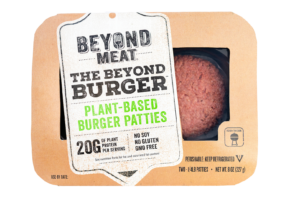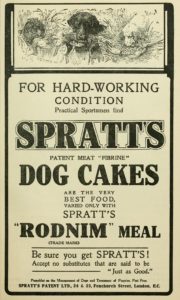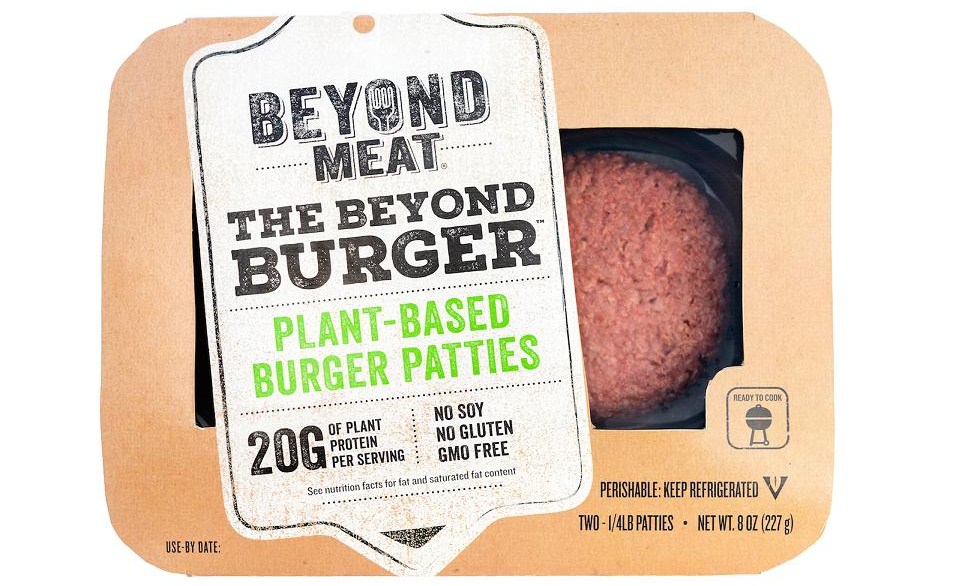26 April 2018
When is Meat not Meat?
France to rename meat substitutes.
By Lynda Goetz
 “‘Sausage’ is not simply a meat product” the lady argued on the radio. “It is a recognised shape”. This does seem to make a fair point, but what about ‘chicken’ or ‘steak’? The French government’s recent decision to legislate against the use of such terms by the meat-substitute industry is an interesting one. The amendment to an agricultural bill was introduced by MP Jean-Baptiste Moreau (also a farmer apparently) and follows fairly quickly on the heels of a ruling by the European Court of Justice (ECJ) last year that terms such as milk, cream and butter used by the dairy industry should not be appropriated by the manufacturers of plant-based substitutes. The argument appears to be that the public may be misled or confused by such terms and think that they are actually buying dairy products or products containing meat. Honestly?
“‘Sausage’ is not simply a meat product” the lady argued on the radio. “It is a recognised shape”. This does seem to make a fair point, but what about ‘chicken’ or ‘steak’? The French government’s recent decision to legislate against the use of such terms by the meat-substitute industry is an interesting one. The amendment to an agricultural bill was introduced by MP Jean-Baptiste Moreau (also a farmer apparently) and follows fairly quickly on the heels of a ruling by the European Court of Justice (ECJ) last year that terms such as milk, cream and butter used by the dairy industry should not be appropriated by the manufacturers of plant-based substitutes. The argument appears to be that the public may be misled or confused by such terms and think that they are actually buying dairy products or products containing meat. Honestly?
 Surely this is all a little too patronising? When my millennial daughter makes a delicious supper of spicy black bean ‘burgers’ and salad, am I really likely to believe they may contain ground/minced meat? Likewise, if I peer into the freezer compartment in my local supermarket and see a pack of ‘Quorn Bacon Style Rashers’ am I liable to come to the conclusion they might contain some actual meat from a pig? The wording ‘Bacon Style’ is surely the giveaway, even without the words ‘Quorn proudly meat free’. Quorn, probably the oldest commercial meat-substitute, in this country at least, is made from ‘Mycoprotein’, according to Quorn’s website, although it fails to elucidate further.* Wikipedia gives a fuller definition and history. Why anyone would want to buy, let alone eat any of this stuff is, to me, a complete mystery. Vegetarianism I can understand, but why do so many vegetarians not actually eat real vegetables? Instead they purchase packets of commercially produced pap with largely unspecified ‘flavourings’ that are supposed to mimic sausages, chicken, bacon or minced meat. Why not make a delicious vegetable curry, a dish of lentil or beans enhanced with interesting spices, a chunky soup or a salad topped with mixed seeds?
Surely this is all a little too patronising? When my millennial daughter makes a delicious supper of spicy black bean ‘burgers’ and salad, am I really likely to believe they may contain ground/minced meat? Likewise, if I peer into the freezer compartment in my local supermarket and see a pack of ‘Quorn Bacon Style Rashers’ am I liable to come to the conclusion they might contain some actual meat from a pig? The wording ‘Bacon Style’ is surely the giveaway, even without the words ‘Quorn proudly meat free’. Quorn, probably the oldest commercial meat-substitute, in this country at least, is made from ‘Mycoprotein’, according to Quorn’s website, although it fails to elucidate further.* Wikipedia gives a fuller definition and history. Why anyone would want to buy, let alone eat any of this stuff is, to me, a complete mystery. Vegetarianism I can understand, but why do so many vegetarians not actually eat real vegetables? Instead they purchase packets of commercially produced pap with largely unspecified ‘flavourings’ that are supposed to mimic sausages, chicken, bacon or minced meat. Why not make a delicious vegetable curry, a dish of lentil or beans enhanced with interesting spices, a chunky soup or a salad topped with mixed seeds?
 However, leaving aside that mystery, should we worry that the use of the word ‘steak’ or ‘milk’ juxtaposed with words such as ‘tofu’ or ‘almond’ is going to mislead consumers? Perhaps given the concerns about literacy levels the worry is that people may not be able to read what it says on the packaging. Maybe we should simply resort to colour coding – red for meat products, green for vegetables and yellow for all the stuff made of fungal protein. Some uncharitable commentators feel that the French legislation is more the result of the French trying to protect the purity of their language than any real concern about making sure that people understand what they are buying. This does not really explain the ECJ ruling last year, which followed a case brought by a German consumer group against German company Tofu Town, nor the attempts by the dairy industry in the US to get similar legislation onto the statute books. In this country, back in September 2016, Sainsbury’s had a neat and witty response to an online rant by one woman following their introduction of a range of ‘non-dairy cheeses’.
However, leaving aside that mystery, should we worry that the use of the word ‘steak’ or ‘milk’ juxtaposed with words such as ‘tofu’ or ‘almond’ is going to mislead consumers? Perhaps given the concerns about literacy levels the worry is that people may not be able to read what it says on the packaging. Maybe we should simply resort to colour coding – red for meat products, green for vegetables and yellow for all the stuff made of fungal protein. Some uncharitable commentators feel that the French legislation is more the result of the French trying to protect the purity of their language than any real concern about making sure that people understand what they are buying. This does not really explain the ECJ ruling last year, which followed a case brought by a German consumer group against German company Tofu Town, nor the attempts by the dairy industry in the US to get similar legislation onto the statute books. In this country, back in September 2016, Sainsbury’s had a neat and witty response to an online rant by one woman following their introduction of a range of ‘non-dairy cheeses’.
 I am all for people eating sustainably and healthily. I am all for educating parents and children alike on the dangers of endless fast-food meals (whether purchased outside school or not) and the links with obesity and Type 2 diabetes. I am all for clear labelling and less packaging. I am however confused by such things as the recently announced proposal by Sainsbury’s to sell meat in special touch-free packages for millennials who are ‘scared of touching raw meat’. Would those be the same millennials who have recently woken up to the devastating effects of single-use plastic?! I am equally confused by legislation, whether it be from the French or the ECJ, regarding nomenclature of plant-based products which has become fairly well-established over the last few decades. Should we perhaps now revisit the use of the term ‘sausage dog’? What about ‘hot dog’ or even ‘hot dogging’? Neither, as far as I am aware, have anything to do with dogs. Language and use of language is fundamental to being human, but maybe, just maybe, the European legislature should lighten up a little? I am completely confused about the benefits of time spent addressing such issues. Is the meat industry trying to make it difficult for the plant-based substitute industry? Does the European public really get misled by soy steaks or tofu butter? What else could you call almond ‘milk’? Does it matter? *
I am all for people eating sustainably and healthily. I am all for educating parents and children alike on the dangers of endless fast-food meals (whether purchased outside school or not) and the links with obesity and Type 2 diabetes. I am all for clear labelling and less packaging. I am however confused by such things as the recently announced proposal by Sainsbury’s to sell meat in special touch-free packages for millennials who are ‘scared of touching raw meat’. Would those be the same millennials who have recently woken up to the devastating effects of single-use plastic?! I am equally confused by legislation, whether it be from the French or the ECJ, regarding nomenclature of plant-based products which has become fairly well-established over the last few decades. Should we perhaps now revisit the use of the term ‘sausage dog’? What about ‘hot dog’ or even ‘hot dogging’? Neither, as far as I am aware, have anything to do with dogs. Language and use of language is fundamental to being human, but maybe, just maybe, the European legislature should lighten up a little? I am completely confused about the benefits of time spent addressing such issues. Is the meat industry trying to make it difficult for the plant-based substitute industry? Does the European public really get misled by soy steaks or tofu butter? What else could you call almond ‘milk’? Does it matter? *
*Since the autumn last year it has had to change labels in the US to show that Mycoprotein ‘is a member of the fungi/mould family’, following a lengthy court case brought by an American campaign group alleging two childhood deaths and thousands of cases of illness were brought on by allergic reactions.
*For a light-hearted look at the subject of modern dietary preoccupations, try watching If Meat Eaters acted like Vegans (possibly not if you’re a dedicated vegan without a sense of humour).


